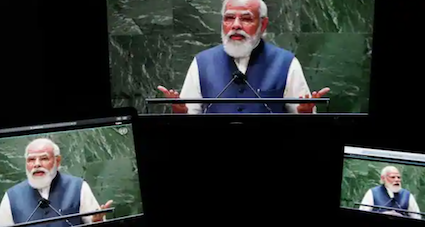Prime Minister Narendra Modi recently addressed the 76th United Nations General Assembly in New York and said that he represents a country that is proud to be the “mother of democracy.” While the statement was enough to underline India’s strong & robust tradition of democracy, many questioned the accuracy of PM Modi’s statement.
Constantino Xavier, a fellow at the Centre for Social and Economic Progress, pointed out in a tweet thread how the idea of democracy belongs to Greeks, not India, and PM Modi is using it as a power tool to promote an Indian culture of political pluralism
The thread was also retweeted by American writer and journalist Sadanand Dhume, whose bio informs that he is based in Washington D.C and is often critical of PM Modi, which sparked the debate on the origin of democracy.
Responding to Dhume, author and journalist Aabhas Maldahiyar presented substantial evidence of how the democratic system has been part of India since ancient times.
He argued that while the ‘West’ claims that Greek gave democracy to the world in around 508 BC, the ancient historian, Diodorus Siculus, also a Greek, pointed out the prevalence of “high level democracy of Indians” even before Alexander, the ancient Greek king, visited India.
He further mentioned that the concept of democracy and welfare state has tits roots in the Indus Valley Civilization and ancient Harappan site in Hisar’s Rakhigarhi village.
Aabhas brings it to the table that important facts of modern parliamentary democracy like a decision by the majority were also prevalent since ancient India and have roots in Vedas. In one of his tweets he draws the similarity between the democratic principles mentioned in Vedic literature with that of the definition that Danish historian Thorkild Jacobsen explains in his book, Primitive Democracy in Ancient Mesopotamia- “A government wherein ultimate power rests with the mass of non-slave male citizens. Although the various functions of government are as yet little specialized and the power structure is loose.”
The terms Sabha( gathering), Samiti ( smaller Gathering or Committee ) Rajan or Raja ( Householder, Leader) exist in both Rig Veda and Atharva Veda. Rig Veda also says that the King (Leader) position was not absolute, and the Sabha or the Assembly could remove him.
Democracy was also prevalent in the Buddhist period. Licchavi, Vaishali, Malak, Madak, Kamboj, etc. are examples of the democratic system of that era. Vaishali’s first king Vishal was chosen through election.
The Buddhist and Brahmanical literature in Pali and Sanskrit shows that non-monarchical forms of government were omnipresent.
He also argued that while ‘West scholar’ always refers to the ancient Athenian society as democratic, but it must be noted: “in the Athenian democracy around 70% of adult population (foreign origin, slaves and women) didn’t had right to participate in Legislation & Executive Bills.”
How can a society where slavery is common, and most adults have no right to choose their representative to be called democratic?
Aabhas’ long researched thread is a prime example of how rich democratic traditions were in ancient Indian republican polities even before the world recognized them.
Additionally, before PM Modi, the concept of native Indian democracy” had also been brought up by other prime ministers, including Atal Bihari Vajpayee and Morarji Desai.
In one of the clips, Morarji Desai can be heard saying, “People forget that democracy is more natural to India than any other country. Because there was democracy in India before any other country in the world even dreamt of it. It is there in the Vedas, described so fully and firmly. If it pleases their vanity, I have no quarrel about it. But we had republics — fully, fairly elected — 2,500 years ago, much earlier than even Greece had its own kind of democracy.”
In 2003, Atal Bihari Vajpayee, at the International Parliamentary Conference to mark the Golden Jubilee of the Parliament of India, said, “Democracy has deep roots in India’s national ethos and our ancient culture, which teaches respect for divergent and even dissenting points of view.”


